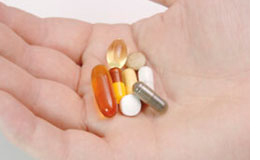Eight steps to good immunity in your child
|
We are surrounded by billions of bacteria and viruses. For many of them, the human body is like a walking smorgasbord, offering almost unlimited resources that they can use as a source of energy and for their reproduction. Fortunately for us, getting into the human body is not an easy task. From the point of view of these tiny organisms, humans are a bit like a fortress. The skin is thick and very difficult to penetrate. Additionally, the skin produces various substances that harm the "invaders". Openings such as the eyes, nose and mouth are protected by fluids and sticky mucus that trap harmful attackers. The respiratory system has mechanical protection in the form of respiratory epithelial cilia, tiny hairs that remove particles. Intruders who get as far as the stomach will encounter highly acidic gastric juice, which will kill most of them. However, despite our fantastic defenses, dangerous intruders can still get through. Some come through our food and others I can slip in through my nose. And as we all know, many things can damage our skin. Every day we get some scratches or cuts, and each time this happens, we are exposed to the intrusion of bacteria or viruses. So what is the magical force that keeps us healthy most of the time? When we hurt ourselves (cut or scratch) and intruders enter our body, our cells are destroyed. Dying cells trigger an automatic response called inflammation, which includes dilating blood vessels and increasing blood flow. Inflammation is the body's equivalent of a burglar alarm. When this alarm goes off, it draws a huge number of defense cells to the site of damage. Increased blood flow helps defense cells get to this place. This is also responsible for the occurrence of redness and swelling in this area. The key to our child's health is its healthy and efficient immune system. That is, prepared for effective operation. What can we do to ensure good immunity for our children? Below we list the seven most important ones. Step 1 – Breastfeeding
It is worth breastfeeding for as long as possible, as it is crucial for the development of immunity in young children. Breast milk provides your baby with a number of substances needed to protect against disease and nutrients your baby needs, including essential fatty acids. Breastfed children are less likely to have infections compared to bottle-fed children. Bottle-feeding deprives the baby of many important substances provided by mother's milk. Another important benefit of breastfeeding, which should not be forgotten, is the emotional well-being of both the child and the mother, which has a multi-directional beneficial effect, including on the functioning of the immune system. Studies have shown that the beneficial effect of breastfeeding on the mental development and emotional stability of a breastfed child persists long after the end of breastfeeding. Step 2 – Take care of appropiate nutrition and dietary supplements
Proper nutrition is essential for the development and maintenance of a healthy and efficient immune system. Nutritional deficiencies may be responsible for chronic immune problems because it is easier for microorganisms to survive and the body lacks important nutrients. The following nutrients are critical to maintaining a healthy immune system: vitamins A, C, D, essential omega 3 fatty acids, and minerals, primarily zinc and selenium. These nutrients can be obtained from food when we eat healthy foods and a varied diet that includes fresh fruits and vegetables, seeds, nuts, legumes and whole grains. Unfortunately, most of the food products available in our stores are industrially produced and contain numerous additives. Industrially processed foods often contain preservatives, dyes, excess sodium, excess sugar, all kinds of artificial flavors and taste enhancers that have no nutritional value but are so loved by children. These are ingredients that may negatively affect the child's immunity. Fatty ingredients consumed in the diet can either support the immune system or disturb it, depending on their type. Vitamins and microelements, although they do not stimulate the immune system themselves, are necessary to maintain its good health and proper functioning. Nutritional ingredients that support the efficient functioning of the immune system are often referred to as immuno-supplements. Below we discuss the most popular and important ones. Probiotics and probiotic foods
This is a very large and diverse group of foods and preparations based on fermenting bacteria. These are bacteria/bacilli of various lactic acid cultures - lactobacillus. Most of them are capable of converting lactose and other simple sugars into lactic acid. They are very common in nature and often have a positive effect on the human and animal bodies. They actively attach to the intestinal walls, creating microflora that competes for nutrients with other organisms, including pathogenic ones. Their presence influences the increased production of IgA antibodies, which are secreted mainly into the gastrointestinal tract and the oral cavity in the form of saliva. In humans, they are present in the digestive tract (they are a very important component of the intestinal flora) and in the vagina of women. Lactobacillus strains are often added to yogurts to enrich their probiotic properties. In ancient Rome, garum was a sauce made of fermented fish. In the Far East, fish sauce and oyster sauce similar to Roman garum are used. Additionally, pickled vegetables sunomono (Japanese pickled cucumber), and Korean kimchi and kkakdugi (fermented cabbage and turnip and Japanese natto and miso (often referred to as the so-called natural vitamin K2 MK7) are consumed, while in Central Asia and North Africa - yogurt, kefir and laymun mutabal i.e. pickled lemons, yerba i.e. pickled grape leaves. In Central and Eastern Europe, mainly sauerkraut, pickled sauer cucumbers and other pickled vegetables and fermented milk products (e.g. sour milk) were consumed, while in Scandinavian countries and England fermented fish (surströmming, gravlax, Worcestershire sauce) and fermented milk products (filmjölk) were consumed , cottage cheese). Dietary SuplementsShark liver oil
Shark liver oil provides substances[1] that have an immuno-modulatory effect. In vitro studies and clinical observations have shown that they support immunity. Chlorella, spirulina, immulinaThey provide a high-molecular lipopolysaccharide complex, which, as research has shown, most effectively stimulates our natural immunity through the lymphatic system of the digestive tract [2]. This complex, in the case of Immulina, was marked as LCEPEEN. It has been comprehensively tested. PolysaccharidesPolysaccharides, i.e. polysaccharides with large molecules. Some of them, such as 1,3 beta-glucan, support the immune system. They are common in the plant world. They can be of plant origin (echinacea, American ginseng, etc.) or from mushrooms (yeast, oyster mushroom, cleft mushroom, lavoise, etc.). They are a popular ingredient of many dietary supplements. Step 3 – Provide your child with a healthy environment
More than tens of thousands of different chemicals litter our environment. Exposure to a number of these substances can damage the immune system, reducing its ability to function properly, fight microorganisms that cause infections, fight serious diseases such as cancer, or cause allergic reactions. Poor air quality (dustiness and gas pollution, e.g. carbon and nitrogen oxides, volatile hydrocarbons), water quality, chronic exposure to pesticides may impair the child's immunity. Even though environmental toxins are almost everywhere, there is much you can do to avoid unnecessary exposure and reduce the amount of chemicals your child may be exposed to. Drinking water from clean sources (e.g. water from Oligocene wells), or buying "healthy" food from organic farming or breeding and from producers who follow ecological production principles. There are also ecological alternatives to cleaning products used in the household, for personal hygiene or for gardening. All this will contribute to creating a healthier environment for our child. Step 4 – Avoid unnecessary use of antibioticsNowadays, antibiotics are quite often prescribed to children, although this is not always justified. The consequences of which may be an increasing resistance of bacteria to the antibiotics used and a worse function of the immune system. Therefore, the doctor and parents should exercise common sense in this matter. Often the reason why a child has a fever is a viral infection and in this case the use of antibiotics will not help. Additionally, fever, if it is not too high (i.e. does not exceed 39 °C) helps fight infection. But when we use an antibiotic prescribed by a doctor, we do not stop the treatment at the first signs of improvement and always administer it according to the doctor's recommendations, making sure to complete the entire treatment. Krok 5 – Resilience, a simple way to build strong immunity
A much better solution is to maintain a healthy lifestyle for your child, which includes natural methods of preventing diseases, including: hardening the body. A hardened child is a healthy child. When the autumn-winter period approaches - the time of the highest incidence of illness - parents have a vision of blocked noses, constant snorting and sneezing, followed by fever and home hospitalization. Unfortunately, the worst-case scenario often comes true because we unconsciously refuse to build the child's immunity by overheating his body, not taking proper care of his diet, limiting his time outdoors at low temperatures or dressing too warmly. Hardening should be done wisely, i.e.: harden without overheating. Make sure your child is dressed appropriately for the ambient temperature and avoid overheating him or her by dressing too warmly. It is also necessary to maintain the appropriate temperature in the rooms where the child stays and ensure proper ventilation. Step 6 – Take care of the child's emotional and mental well-being
The best food for a child's (also for adults') immune system is love and attention. A baby needs regular cuddling, holding, massaging, rocking, nurturing, touching and kissing. A child who knows and feels that he is loved by the people around him often laughs and has positive thoughts and feelings, which has a beneficial effect on the cells of the immune system. The more often a child laughs and is happy, the better his immune system functions and the healthier he is. Mental (emotional) stress and worry can deplete the immune system and reduce a child's resistance to disease. Breastfeeding can be an important factor in protecting against stress and promoting good mood in babies. Light massage is another great way to relieve your baby of stress or tension and can support the immune system. Step 7 – Take care of sleepThe role of sleep and its impact on well-being and health cannot be overestimated. During sleep, the processes of rest, memory and regeneration occur. Studies have shown poorer immune system performance in people who didn't get enough sleep compared to people who got the right amount. How sleep can boost your childs immunity Step 8 — Do not isolate our children
Our immune system must be constantly stimulated/trained. Therefore, let's not isolate our children from their surroundings and let's not be afraid of exchanging stimuli that stimulate the immune system. Studies have shown that children who are "hidden under shelter", if they get sick, are sick much longer and more seriously. One of the many explanations for weak immune system in the developed world is the “hygiene hypothesis.” This hypothesis suggests that the critical post-natal period of immune response is derailed by the extremely clean household environments often found in the developed world. In other words, the young child’s environment can be “too clean” to pose an effective challenge to a maturing immune system. The eight simple and essentially cheap steps presented above can provide our child with a healthy and well-functioning immune system, which is the key to our child's health. [1] Olej z wątroby rekina dostarcza przede wszystkim alkiloglicerole i skwalen, które wspomagają układ odporności. Poza tym jest źródłem kwasów omega 3. [2]Immulina dostarcza specjalny kompleks lipo-polisacharydowy ze spiruliny, który działa poprzez komórki układu odporności (komórki dendrytyczne i makrofagi) obecne w przewodzie pokarmowym. Nasza naturalna odporność powstaje przede wszystkim w tkance limfatycznej przewodu pokarmowego. |






